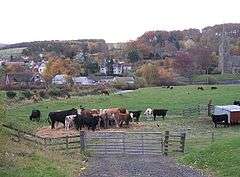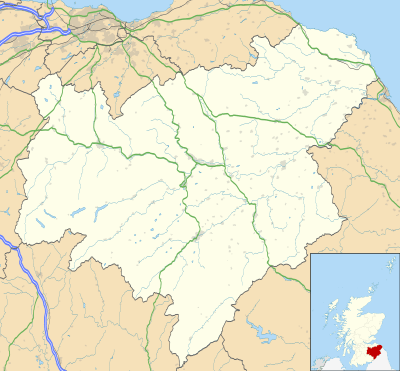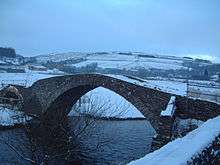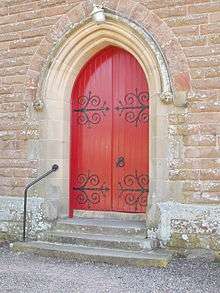Stow of Wedale
Stow of Wedale, or more often Stow, /ˈstaʊ/ is a village in the Scottish Borders area of Scotland (historically Midlothian), 7 miles (11 kilometres) north of Galashiels. In the 2011 Census the population was 718. It is served by Stow railway station.
| Stow | |
|---|---|
 | |
 Stow Location within the Scottish Borders | |
| Population | 718 Scotland's Census 2011 |
| OS grid reference | NT456447 |
| Council area | |
| Lieutenancy area | |
| Country | Scotland |
| Sovereign state | United Kingdom |
| Post town | GALASHIELS |
| Postcode district | TD1 |
| Dialling code | 01578 |
| Police | Scotland |
| Fire | Scottish |
| Ambulance | Scottish |
| UK Parliament | |
| Scottish Parliament | |
Stow of Wedale | |
|---|---|
| Elevation | 180 m (590 ft) |
The name
The name Stow is an Old English word stōw meaning 'holy place' or 'meeting place', whilst Wedale is probably derived from the words wēoh (or wīg) meaning 'shrine' and dæl meaning 'valley'.[1]

The Church
There has been a church at Stow since the 7th century, but the earliest example still visible today was built in the late 15th century on the site of the Church of St Mary which was consecrated on 3 November 1242. The church used today, St Mary of Wedale, was built in 1876 and features a 140 foot high clock tower. Our Lady's Well is situated 1 mile (2 kilometres) south of the village and was rebuilt in 2000.
A rare example of a packhorse bridge, built in the 1650s, can be found in Stow. Stow was an important place in the woollen and agricultural industries in the 19th century.
In 1870, James Thin purchased a plot of land in the village and had a house built which was completed in 1873 and was named Ashlea. This house is still a private residence but is not owned by the Thin family.

Famous residents
- Sir John Rose Cormack (1815–1882) was born and raised in Stow.
- John Downie Falconer FRSE (1876-1947), geologist, was born in Stow
- Sir Walter Mercer FRSE (1890-1971) orthopaedic surgeon
See also
References
- Smith, A. H. (1956). English place-name elements. Cambridge: English Place-Name Society. pp. i.125, ii.159, ii.264–5.
Sources
- E-book on "Celtic Saints and Ancient churches of Strathearn
- RCAHMS record of Stow, Wedale View, General
- RCAHMS/Canmore record of Old Stow Kirk and Churchyard
- Scottish Churches Architectural Heritage Trust, grants awarded
- PDF: An excavation at the Bishop's House, Stow, Scottish Borders
- Ordnance Gazetteer of Scotland (extracts).
- Killochyett: Stow of Wedale
- A History of Stow Church
- Pictures around Stow
| Wikimedia Commons has media related to Stow of Wedale. |